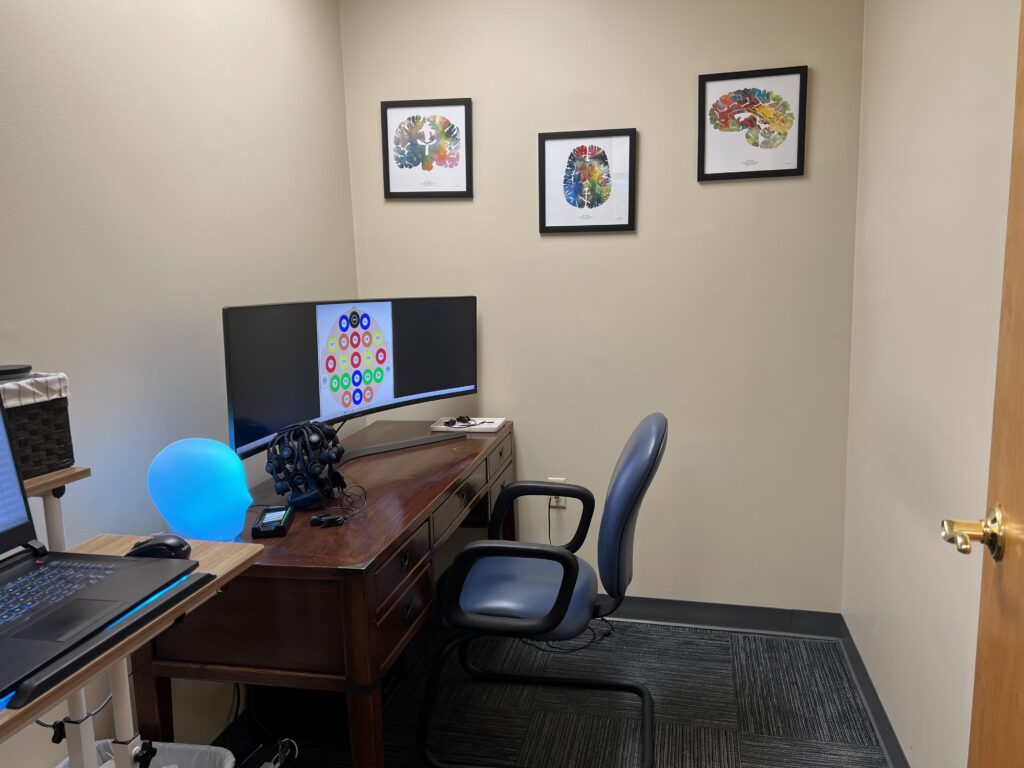‘There are no generic patients’: Eden Center offering personalized, unique mental health treatments

GLENS FALLS — The Eden Center for Integrative Care, which offers unique and personalized mental health treatments, has seen rapid expansion in its first year of operation. According to owner and director Daniel Breeyear, the expansion speaks to the need for mental health services in the region.
“Going from six to 26 employees in a year just kind of highlights the growth and the need for this sort of service in the community,” said Breeyear.
The Eden Center, which opened in August 2021, focuses on personalized care, “because there are no generic patients,” said Breeyear.
“Everybody is a unique individual, with individual genetics and individual life circumstances,” said Breeyear.
He said the Eden Center helps patients by getting to the “root of things.”
“If you go into your doctors’ office and you tell them you’re depressed, a lot of times they’ll throw an antidepressant at you. But they don’t ever really ask why you’re depressed to begin with,” said Breeyear. “So we get to the root of things, that’s how things are ultimately fixed.”
While the Eden Center does prescribe medication, Breeyear stressed that their focus is on “the whole-body approach,” supplementing medication with a focus on neurotransmitters, neurofeedback, anti-inflammation, IV nutrition, and more. The Center offers multiple unique treatments, with Breeyear saying, “I don’t think there’s anything like it from Canada to Albany.”
“We get into the biology of how neurotransmitters are created, brain regions that are not functioning optimally. How do we get those back on track?,” Breeyear said.
The Eden Center provides pediatric and holistic care, with Breeyear saying he primarily handles that, while the Center also treats substance use and addiction. Breeyear said the Center also has 15 psychotherapists on hand, offering “traditional talk therapy.”
The Center offers a hyperbaric oxygen chamber used for anti-inflammatory and mental health purposes, with Breeyear saying the Center has the same chamber used by NBA star LeBron James.
“Same exact chamber, same exact model. That’s an athlete using that for anti-inflammatory purposes,” said Breeyear, mentioning former NFL quarterback Joe Namath as another example in sports. “That’s one thing that kind of helps a lot of different aspects of care.”
Breeyear said that the Center’s IV nutrition can help people treat deficiencies for things such as vitamin D.
“A lot of the vitamin infusions are geared towards anti-inflammation, replenishing things that you’re not getting from nutrition or from just where you live geographically,” Breeyear said. “Low testosterone can look like depression. In the same token, estrogen levels with a woman, or iron levels, can feel like fatigue and malaise and depression.”
The Eden Center also offers a neurofeedback system, with Breeyear saying it can help identify “areas of dysfunction” in the brain.
“It’s reading brainwave frequencies and it’s balancing those sorts of things on a database of 250,000 other brains of the particular individual’s demographic,” said Breeyear. “With that, it can identify areas of dysfunction, depression, ADHD, anxiety, OCD, schizophrenia, memory, sleep, all those sorts of things. With that information, the person can then come back and do brain training, essentially.
“We’re using all those things to either enhance or kind of relieve different problems and concerns, more so than just the traditional methods.”
The Eden Center has also recently begun ketamine treatments for “resistant depression,” said Breeyear.
“These people have been depressed for a long time, and the traditional medications don’t work. So they’ll come in, and we’ll do that sort of thing,” Breeyear said. “We’re doing intranasal, up through the nose, now, but we’ll be launching IV versions and a more widespread intranasal program pretty soon in the next month or so.”
Intake appointments typically last between 60 and 90 minutes, Breeyear said, with follow-ups lasting roughly a half-hour.
“That’s longer than you get at most places, even specialty care. We are able to see less people during the day, but I think the care has improved, because you’re taking more time, you can talk through more things,” said Breeyear. “It’s tough to do all those aspects of assessment in a short period of time.”
Not all of the Center’s services are covered by insurance, with Breeyear saying they are working to establish a non-profit, the Eden Center Foundation, to assist patients with potential costs.
“That was an area of need that I identified within the first year. It was hard having somebody sit across from me, knowing that you could help them, but there’s the financial component on their side and ours,” Breeyear said. “I think that’s a way to kind of alleviate some of that, and really make a difference.”
He said the Foundation would help cover costs for services such as the hyperbaric chamber, neurofeedback scans, supplements, and specialty therapy treatments.
As the Eden Center continues to grow its services, Breeyear said he aims to continue to meet need by adding staff and expanding.
“Not so many where I don’t know who you are anymore, but enough where we can continue the level of care,” said Breeyear. “If I need to go somewhere else, to add a second location or a bigger one at some point, that’s what I’ll do. But I think as long as the need and demand is there, we’ll continue to meet it until it’s not.”
For Breeyear, a native of Fort Edward and current South Glens Falls resident, the opportunity to offer mental health services in his home region “meant a lot,” he said.
“This is where I grew up, so it wasn’t hard to see the need and hear the stories of your kid’s friends, and their friends’ friends, and the school things and all that,” said Breeyear. “It’s good to be in the middle of it, and I think we’ve shown the need is definitely there.”